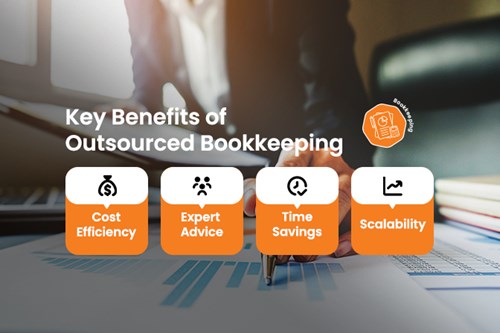
In today’s fast-paced business environment, managing financial records accurately and efficiently is essential for long-term success. However, handling bookkeeping tasks in-house can be time-consuming and overwhelming, especially for small and growing businesses. This is where outsourced bookkeeping services come into play. By outsourcing your bookkeeping functions, you can streamline financial processes, save time, and focus on core business activities.
Outsourced bookkeeping services involve hiring an external service provider to manage your bookkeeping tasks. These tasks include recording transactions, reconciling accounts, preparing financial statements, processing payroll, and ensuring compliance with tax laws. Rather than dedicating internal resources to these tasks, you can outsource them to professionals who specialize in financial management. These service providers typically use cloud-based software and advanced systems to handle the work remotely, giving you access to your financial information in real-time.
One of the key benefits is access to a team of experts without the need to recruit, train, and manage an in-house accounting team. Professional providers employ certified accountants and bookkeepers who are well-versed in the latest tax regulations, financial reporting standards, and bookkeeping software. This allows businesses to maintain compliance, mitigate the risk of financial errors, and avoid penalties while having peace of mind knowing their financial records are in capable hands.
Outsourcing also offers flexibility. You can choose to outsource specific tasks or the entire bookkeeping process, depending on your business's needs. For example, some businesses may only require help with year-end financial statements, while others may need ongoing support for daily transaction processing and payroll management.
Integrating outsourced bookkeeping services into your business operations can offer several significant advantages. Here are some of the most impactful benefits:
One of the primary reasons businesses turn to outsourcing is cost efficiency. Managing an in-house bookkeeping team can be expensive due to salaries, benefits, and overhead costs such as office space and accounting software. By outsourcing, you eliminate these costs and pay only for the services you need. Outsourcing allows you to reduce your financial burden while still maintaining high-quality financial management.
When you outsource your bookkeeping, you gain access to a team of experienced professionals who offer valuable financial insights. These experts can provide advice on budgeting, cash flow management, tax planning, and financial forecasting, helping you make informed decisions that support business growth. Outsourced service providers also stay up to date with the latest accounting standards, ensuring that your financial reports are accurate and compliant with regulations.
Bookkeeping is a time-consuming task that requires attention to detail and constant monitoring. By outsourcing these functions, business owners and managers free up valuable time that can be dedicated to growing the business, enhancing products and services, or improving customer satisfaction. Delegating bookkeeping tasks to professionals allows you to focus on your core business activities, increasing productivity and reducing the stress associated with managing financial records.
As your business expands, your bookkeeping needs will likely become more complex. Outsourced services are scalable, meaning they can grow alongside your business. Whether you need additional financial reporting, tax planning, or payroll services, an outsourced provider can easily adjust their services to meet your changing needs. This scalability eliminates the need to hire additional staff or train employees as your business grows, allowing you to focus on expansion and success.

With the rise of technology, online bookkeeping services have transformed the way businesses handle their financial tasks. These services leverage cloud-based systems to provide real-time access to financial data, allowing business owners to view their accounts, monitor transactions, and generate reports from anywhere at any time.
Cloud-based bookkeeping offers several advantages over traditional, manual systems. First, it allows for seamless collaboration between the business owner, the outsourced bookkeeping team, and the accountant. Multiple users can access the same financial data in real-time, reducing the likelihood of errors or discrepancies and making it easier to resolve issues quickly. This level of transparency ensures that everyone involved has the same accurate information, leading to better decision-making.
For small and growing businesses, online bookkeeping services are particularly beneficial because they eliminate the need to invest in costly accounting software or hardware, making it easier to manage bookkeeping for small businesses effectively. All data is securely stored in the cloud, which reduces the risk of data loss and ensures that financial records are always backed up. Additionally, online bookkeeping platforms often integrate with other business software, such as customer relationship management (CRM) systems and invoicing tools, making financial management even more efficient.
Selecting the right provider for business bookkeeping services is critical to ensuring a successful partnership. Here are a few factors to consider when choosing an outsourced bookkeeping provider:
It’s essential to choose a provider with a strong reputation and proven experience in handling bookkeeping tasks for businesses similar to yours. Providers with industry-specific knowledge understand your unique financial challenges and requirements. Their expertise will help ensure that your financial records are handled professionally and in accordance with industry regulations.
A reliable outsourced service provider should use the latest technology, including cloud-based accounting software that offers real-time access to financial data. Make sure the provider’s tools align with your business’s needs, offering features like data security, automated reporting, and seamless integration with your existing systems.
Your bookkeeping needs will likely change as your business grows. Choose a provider that offers flexible plans and scalable services. This ensures that you can adjust the level of support you receive without needing to hire new staff or change service providers. Outsourced providers should be able to scale up or down based on your business’s evolving requirements.
Since bookkeeping involves handling sensitive financial information, it's crucial to select a provider with strong data security measures in place. Look for providers that use data encryption, secure cloud storage, and access control to protect your information. A good outsourced provider will prioritize the confidentiality and security of your financial data.
By carefully evaluating potential service providers based on these criteria, you can ensure that your bookkeeping needs are met with professionalism and accuracy, allowing your business to thrive.
Integrating outsourced bookkeeping services into your business strategy is a powerful way to improve efficiency, reduce costs, and enhance financial management. By outsourcing bookkeeping to a trusted provider like Finbook Global, businesses can benefit from expert advice, advanced technology, and scalable services that adapt to their needs. This approach allows you to focus on the core areas of your business, such as product development, customer service, and growth.
Outsourcing bookkeeping is not just a cost-cutting measure; it’s a strategic decision that can help businesses maintain accurate financial records, stay compliant with tax regulations, and drive long-term success. With Finbook Global’s comprehensive accounting outsourcing services, your business can streamline its financial operations, increase profitability, and achieve sustained growth over time.

Find out more about Finbook global by joining an interactive demo. We'll call back you soon !